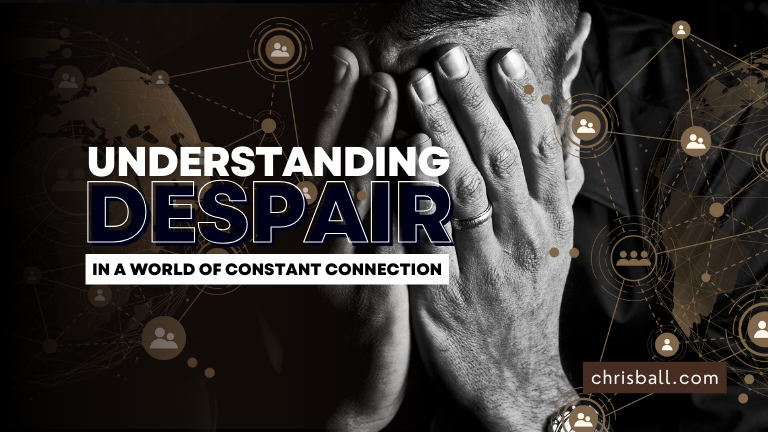In today’s digital era, where connections are often a click away, the paradox of feeling more isolated than ever is a stark reality. Søren Kierkegaard’s exploration of despair in “The Sickness Unto Death” provides a profound lens through which we can examine our contemporary state of being. Kierkegaard, a Danish philosopher and the father of existentialism dissected the nature of despair and its manifestations, revealing insights that resonate with the challenges of modern society.
Kierkegaard identified despair not merely as a feeling but as a condition of the soul that arises from a misalignment or imbalance within the self. This condition, he proposed, stems from an individual’s relationship—or lack thereof—with the self, others, and, ultimately, with the eternal or divine. In today’s context, where digital connections often substitute for deeper, meaningful relationships, Kierkegaard’s types of despair echo loudly, manifesting in new but unmistakably familiar forms.
The Despair of Not Being Conscious of Having a Self
The first type of despair Kierkegaard describes is the despair of not being conscious of having a self. This form of despair manifests in individuals who identify entirely with externalities—achievements, social status, or online personas—without recognising the deeper, intrinsic value of their own selfhood. In the age of social media, this type of despair is rampant. People curate their online presence to reflect an idealised version of themselves, seeking validation through likes, shares, and comments, often disconnecting from their authentic selves in the process.
The Despair of Not Wanting to Be Oneself
Conversely, the despair of not wanting to be oneself arises when individuals recognise their self but reject it, wishing to be someone else. This despair is amplified today by the constant bombardment of curated success stories and highlight reels on social media platforms. The incessant comparison with others’ seemingly perfect lives can lead to a rejection of one’s own identity and circumstances, fostering a desire to escape one’s reality.
The Despair of Wanting to Be Oneself
The most profound despair, according to Kierkegaard, is the despair of wanting to be oneself, but in isolation from the power that established the self. This despair manifests as a defiant assertion of individuality, rejecting any higher purpose or meaning beyond the self. In today’s hyper-individualized society, where the emphasis on personal freedom and self-expression often crosses into narcissism, this form of despair is evident. It’s the influencer who believes their worth is measured by their follower count, the individual who pursues personal gain without regard for communal well-being, or the person who sees no value beyond the material world.
In all these manifestations of despair, the common thread is a disconnection from something greater than the self—a purpose, a community, or a higher power. The constant digital connection of today’s world, paradoxically, amplifies this disconnect, fostering environments where superficial interactions replace genuine human connections, where the value of the self is measured by external metrics, and where the incessant noise drowns out the quest for deeper meaning.
Kierkegaard’s work invites us to reflect on the nature of our connections and the quality of our engagement with the world and ourselves. It challenges us to confront our despair—not to despair of despair but to see it as a signpost pointing toward the need for a more profound, authentic connection with ourselves and the world around us. Understanding and acknowledging the types of despair Kierkegaard describes is the first step toward forging deeper, more meaningful relationships in a world of constant connection. It’s a call to rediscover the value of silence in the age of noise, the importance of presence in the era of distraction, and the significance of seeking a purpose beyond the self in a culture that often celebrates the superficial.
In embracing these challenges, we find the path to a richer, more connected existence, transcending the despair that Kierkegaard so insightfully dissected.
New Translation Update
Last week marked the completion of my journey in translating this remarkable book into English. It’s a milestone that fills me with excitement as the work now undergoes review by experts. I’m hopeful for their seal of approval. Please keep your fingers crossed for this labour of love to come to fruition.
